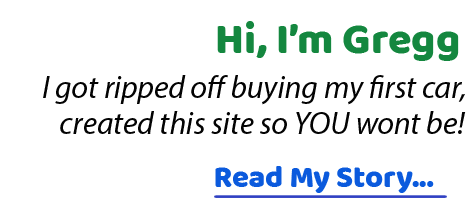Common Used Car Buying Scams
In the world of used cars, if you shop around long enough, you'll encounter some common scams - although they're not as prevalent as they used to be.The most common type of scam are all the little lies salesmen tell you to increase the pressure. But this isn't limited to just used cars, you find it in any high pressure sales environment. The way to combat this is to educate yourself - which you're obviously doing by reading this (kudos to you!).
Let's take a look at some of the other scams you may encounter.
"Certified" Used Cars
True certified used cars are sold ONLY through franchised dealers. They have gone through a manufacturer backed multi-point inspection process and usually come with some sort of extended warranty.
Certified used cars come with a price premium - usually at least $1,000 over their non-certified counterparts.
This creates an attractive opportunity for unscrupulous car dealers. They figure if they slap a certified sticker on a used car, they can sell it for more - and many do.
You'll find this scam being played out at independent used car lots which are not affiliated with any manufacturer. Their "certification" is not backed by anything, so don't pay extra for it.
Curbstoning
Curbstoners are car dealers that pose as private individuals. They will post ads in various classified sites such as Craigslist and pretend to be the owner just trying to sell their car.
You may be thinking this is harmless, but these curbstoners are not only breaking the law, but are usually selling vehicles with hidden problems that can affect its safety and value.
These types of car dealers are the lowest of the low. They sell vehicles that no reputable dealer would touch. Some even go as far as selling a car that's been totaled and had its title registered in another state to hide the fact.
There are some steps you can take to prevent curbstoning. First, always make sure to get a Vehicle history report (keep in mind this is not fool-proof).
You also need to ask to see the driver's license of the seller along with the car's title. If the names don't match, don't buy the vehicle.
Always have the car thoroughly inspected by a mechanic. This can uncover safety problems and hidden damages.
Before replying to any classified ad, do a search for the phone number and see if it appears in multiple ads across the web.
Bluebook Values
It's a well-known "secret" that blue book values are oftentimes misleading in the dealer's favor.
The common consumer guides are not the same ones dealers use. They're often out-dated and not very specific when it comes to local market conditions.
Dealers will take advantage of this by advertising prices "below blue book value".
Don't fall for this scam. There really is no fool-proof way to gauge the true market value for any vehicle. It's always what the local market will bear.
Your best bet is to take your time and comparison shop as many vehicles as you can. Use tools provided by CarGurus.com and ClearBook to determine the average list prices of vehicles in your area. After awhile, you'll get an intuitive feel for what the vehicle is truly worth.

Each week, I'll keep you up-to-date on the latest car deals and news that might affect your purchase. This includes...
- Best Rebates, Incentives, and Lease Deals
- Latest Car Buying Scams and Tricks
- The Best & Worst Time to Buy a Car
- Which Cars You Should Avoid
About The Author
 Gregg Fidan is the founder of RealCarTips. After being ripped off on his first car purchase, he devoted several years to figuring out the best ways to avoid scams and negotiate
the best car deals. He has written hundreds of articles on the subject of car buying and taught thousands of car shoppers how to get the best deals.
Gregg Fidan is the founder of RealCarTips. After being ripped off on his first car purchase, he devoted several years to figuring out the best ways to avoid scams and negotiate
the best car deals. He has written hundreds of articles on the subject of car buying and taught thousands of car shoppers how to get the best deals.




Got a Question About This Article?